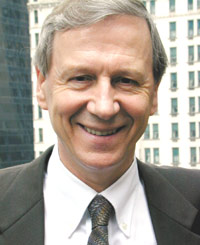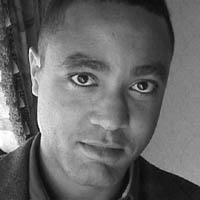 |
 |
|
Richard Dawkins |
Steven Pinker |
IS SCIENCE KILLING THE SOUL?
Richard Dawkins & Steven Pinker
Chaired by Tim Radford
Introduction
By John Brockman
On February 10, 1999, The Guardian-Dillons Debate at the Westminster Central Hall in London featured Richard Dawkins and Steven Pinker in an event chaired by Tim Radford, Science Editor of The Guardian. Sold out weeks in advance, the evening attracted 2,300 attendees, with hundreds waiting outside. It was one of the toughest tickets in London in years.
The evening echoes an event held in Munich last November, "The Digital Planet", for which a thousand people turned out in a driving rainstorm to see and hear Dawkins and Pinker as well as Daniel C. Dennett and Jared Diamond introduced by Douglas Adams. More than a hundred journalists were in the audience. The lobby of the hotel looked more like the press center for a presidential election campaign.
Clearly, something is happening with this group of intellectuals.
While The Guardian-Dillons series is characterized as a "debate", Dawkins and Pinker, who are in general agreement across broad areas, presented what I would characterize as a high level seminar. As Dawkins pointed out: "The adversarial approach to truth isn't necessarily always the best one. On the contrary, when two people disagree strongly, a great deal of time may be wasted. It's been well said that when two opposite points of view are advocated with equal vigor, the truth does not necessarily lie mid-way between them. And in the same way, when two people agree about something, it's just possible that the reason they agree is that they're both right. There's also I suppose the hope that in a dialogue of this sort each speaker may manage to achieve a joint understanding with the other one, better than he would have done on his own."
— JB
RICHARD DAWKINS is an evolutionary biologist and the Charles Simonyi Professor For The Understanding Of Science at Oxford University; Fellow of New College; author of The Selfish Gene (1976), 2d ed. 1989), The Extended Phenotype (1982), The Blind Watchmaker (1986), River out of Eden (1995) (ScienceMasters Series), Climbing Mount Improbable (1996), and Unweaving the Rainbow (1998).
(Click here for Dawkins on Edge)
STEVEN PINKER is professor in the Department of Brain and Cognitive Sciences at MIT; director of the McDonnell-Pew Center for Cognitive Neuroscience at MIT; author of Language Learnability and Language Development (1984), Learnability and Cognition (1989), The Language Instinct (1994), and How the Mind Works (1997).
(Click here for Pinker on Edge)
TIM RADFORD is Science Editor of The Guardian
Edge thanks The Guardian and Dillons for permission to run the Guardian-Dillons Debate at the Westminster Central Hall on February 10, 1999






